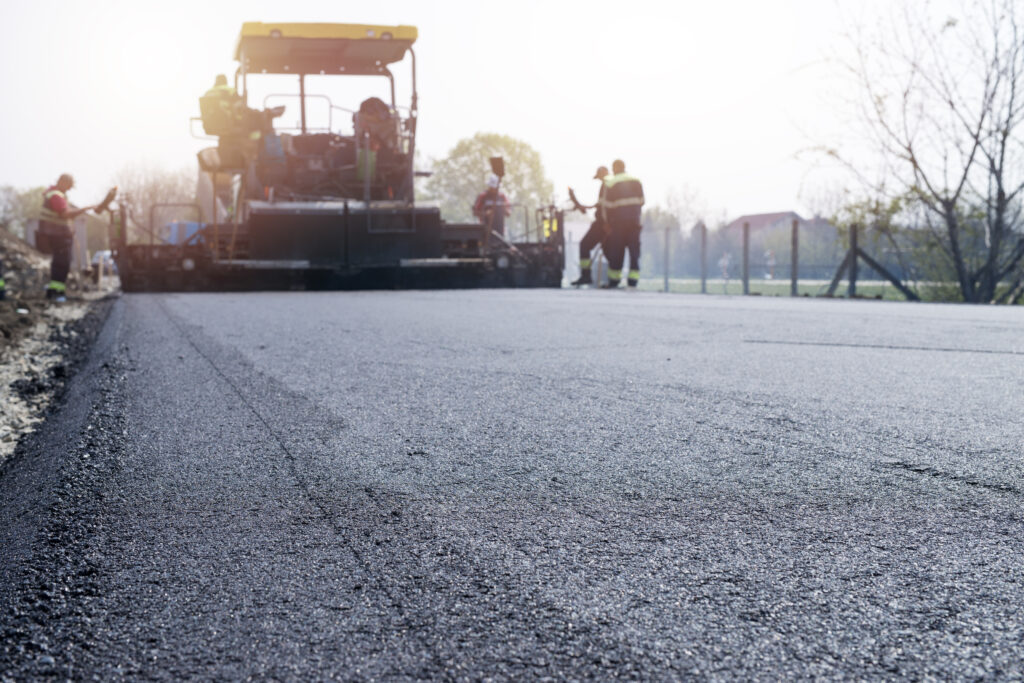Understanding Asphalt Resurfacing and Replacement
Asphalt surfaces are a popular choice for residential driveways, commercial parking lots, and roadways due to their durability, cost-effectiveness, and ease of installation. However, like all paving materials, asphalt can deteriorate over time due to weather, traffic, and natural wear and tear. When your asphalt surface starts showing signs of aging or damage, it’s essential to understand the differences between asphalt resurfacing and replacement to make the best decision for your paving project.

What is Asphalt Resurfacing?
Asphalt resurfacing, also known as an overlay or simply resurfacing, is the process of applying a new layer of asphalt over an existing surface. Resurfacing is a popular choice for extending the life of pavement without the need for a complete replacement. It is an excellent option when the underlying base and subgrade are still in good condition, and the asphalt has only minor cracks or surface imperfections.
What is Asphalt Replacement?
Asphalt replacement, on the other hand, involves the complete removal of the existing pavement and the installation of a new asphalt surface. This process is typically recommended when the existing pavement has significant structural issues or severe damage that cannot be adequately addressed through resurfacing alone. Asphalt replacement can be more costly and time-consuming than resurfacing but is necessary in certain situations to ensure the longevity and structural integrity of the paved surface.
Factors to Consider When Deciding Between Resurfacing and Replacement
-
Age and Condition of the Existing Surface
One of the primary factors to consider when deciding between resurfacing and replacement is the age and condition of the existing asphalt surface. As a general rule, asphalt surfaces have a lifespan of approximately 20 to 30 years with proper maintenance. If your pavement is nearing the end of its expected life or has significant damage, such as large cracks, potholes, or major depressions, replacement may be the best option.
-
Structural Integrity of the Base and Subgrade
The base and subgrade are crucial components of any asphalt surface. They provide the necessary support and stability for the pavement. If the base and subgrade are compromised, it can lead to premature failure of the asphalt surface, regardless of whether it has been resurfaced or replaced. An experienced asphalt contractor can evaluate the condition of the base and subgrade and recommend the appropriate course of action.
-
Budget and Time Constraints
The cost and time required for asphalt resurfacing and replacement can vary significantly. Resurfacing is often more affordable and quicker to complete than replacement, making it an attractive option for property owners with budget or time constraints. However, it’s essential to keep in mind that resurfacing may only provide a temporary solution if the underlying issues are not addressed. In such cases, a full replacement may be the most cost-effective option in the long run.
-
Environmental Impact
The environmental impact of your paving project should also be considered when deciding between resurfacing and replacement. Asphalt resurfacing has a lower environmental impact, as it requires fewer raw materials and generates less waste. Additionally, asphalt is a highly recyclable material, with up to 99% of reclaimed asphalt pavement (RAP) being reused in new paving projects.
Consult with a Reputable Asphalt Contractor
The decision between asphalt resurfacing and replacement is not always straightforward, as it depends on several factors unique to your specific paving project. To ensure the best outcome, it’s crucial to consult with a reputable, experienced asphalt contractor who can assess your pavement’s condition, evaluate the base and subgrade, and provide expert guidance on the most appropriate solution for your needs.
-
Ask for a Comprehensive Evaluation
When selecting an asphalt contractor, make sure they conduct a thorough inspection of your pavement and provide a detailed evaluation report. This report should include the current condition of your pavement, the extent of any damage, and recommendations for either resurfacing or replacement. A comprehensive evaluation is essential for making an informed decision and ensuring the longevity of your asphalt surface.
-
Check for Proper Licensing and Insurance
Before hiring an asphalt contractor, confirm that they have the necessary licenses and insurance coverage required in your area. This step is crucial for protecting yourself from potential liability and ensuring you’re working with a reputable professional.
-
Review Their Past Projects and Client Testimonials
A reputable asphalt contractor should have a portfolio of past projects and client testimonials that demonstrate their expertise and quality of work. Reviewing these materials can give you valuable insights into their experience with projects similar to yours and the level of customer satisfaction they have delivered.
Deciding between asphalt resurfacing and replacement can be a complex decision, requiring careful consideration of factors such as the age and condition of the existing surface, the structural integrity of the base and subgrade, budget and time constraints, and the environmental impact. By consulting with Anderson Striping & Construction Services, an experienced, reputable asphalt contractor, and taking the time to evaluate your specific situation, you can ensure that you choose the best solution for your paving project and maximize the lifespan and performance of your asphalt surface.
https://goo.gl/maps/UypLnkYuXLnmiq9a7
